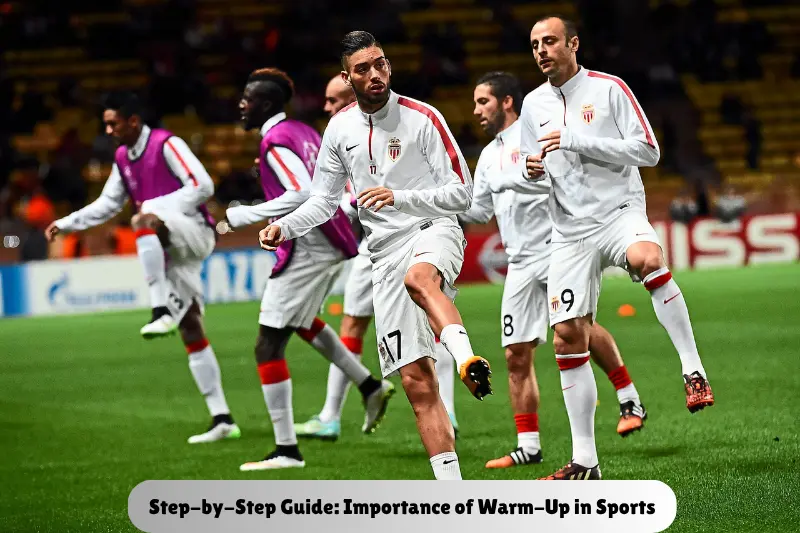Introduction
Have you ever seen athletes jogging or stretching before a match or workout? That’s called a warm-up—and it’s much more important than it may seem. Whether you\’re playing a sport, hitting the gym, or going for a run, warming up helps get your body and mind ready for action. It’s like giving your muscles a gentle wake-up call so they can perform better and stay safe from injuries. In this blog post, we’ll explain why warming up matters, how it helps your body, and the best ways to do it properly.
What is a Warm-Up?

A warm-up is a short and gentle exercise session you do before starting any intense physical activity or sport. The main goal is to slowly prepare your body for action. It usually includes light movements like walking, jogging, or stretching that help increase your heart rate, warm your muscles, and improve blood flow.
Think of it like warming up your car engine on a cold day—you don’t just hit full speed right away. Your body works the same way. A proper warm-up helps you move better, feel more flexible, and reduces the chance of getting hurt during exercise or sports.
Why Is Warming Up So Important?
Warming up before exercise or playing sports is something you should never skip. Here’s why it’s so important:
Get Your Body Ready
- Warming up slowly increases your heart rate and sends more blood to your muscles. This gives your body the oxygen and energy it needs to perform well.
Prevents Injuries
- Cold muscles are tight and can get hurt easily. A warm-up helps loosen them, making your body more flexible and reducing the risk of muscle pulls, strains, or joint injuries.
Improves Performance
- When your body is warmed up, your muscles and joints move more freely. This helps you run faster, jump higher, and move more smoothly during your activity.
Boosts Mental Focus
- A good warm-up isn’t just for your body—it helps your mind too. It gives you a few minutes to focus, build confidence, and get into the right mindset for your sport or workout.
Activates Key Muscles
- A warm-up gently wakes up the muscles you’ll be using the most. This improves your coordination and control, making your movements safer and more effective.
Step-by-Step Guide: Importance of Warm-Up in Sports

Step 1: Understand What a Warm-Up Is
- Start by knowing what a warm-up actually means.
- It is a short session of light to moderate physical activity performed before engaging in more intense sports or exercise. Its goal is to gradually prepare the body — physically and mentally — for the upcoming effort.
Step 2: Know the Two Types of Warm-Ups
To warm up properly, it helps to know there are two main types:
General Warm-Up
- Involves full-body movements like jogging, jumping jacks, or cycling to increase your overall heart rate and body temperature.
Specific Warm-Up
- Focuses on movements related to the particular sport or activity, such as dribbling for basketball, stretching for gymnastics, or shadow kicks for martial arts.
Step 3: Learn the Physical Benefits
Warming up is not optional — it has real physical advantages:
- Increases muscle temperature, making muscles more elastic and responsive.
- Improves blood flow, delivering oxygen to working muscles.
- Enhances joint lubrication and range of motion.
- Prepares the cardiovascular system for physical exertion.
Step 4: Understand How It Boosts Performance
Warming up helps you perform better. Here\’s how:
- Prepares muscles and nerves for fast, coordinated movements.
- Improves balance, reaction time, and muscle control.
- Increases energy availability through better oxygen delivery.
Step 5: Use Warm-Ups to Prevent Injuries
Skipping a warm-up raises your injury risk. A proper warm-up:
- Loosens tight muscles and tendons.
- Reduces the chance of muscle strains and ligament sprains.
- Makes body tissues more resilient during sudden or intense movements.
Step 6: Focus on Mental Preparation
Warm-ups aren’t just about the body — they prepare the mind too:
- Helps you switch from rest mode to game mode.
- Reduces stress and pre-competition anxiety.
- Improves concentration and confidence before a match or workout.
Step 7: Follow an Effective Routine
Here’s a basic warm-up routine to follow before most sports:
- 5 minutes of light cardio – jogging, jumping jacks, skipping
- 5 minutes of dynamic stretching – leg swings, arm circles, torso twists
- 5 minutes of sport-specific drills – short sprints, passing drills, body movements used in your game
Step 8: Avoid Common Warm-Up Mistakes
Many athletes make these errors — avoid them for maximum benefit:
- Skipping warm-up altogether
- Doing only static stretches before activity (save these for after)
- Rushing through warm-up without sport-specific movements
Step 9: Make It a Habit
Consistency is key.
- Make warming up a permanent part of your training routine. Whether it’s a practice session or a major competition, never start without a proper warm-up.
Step 10: Educate and Encourage Others
- If you\’re a coach, team leader, or fitness enthusiast, share this knowledge. Encourage others to take warm-ups seriously. A well-informed team is a safer and better-performing team.
Conclusion
Warming up is a simple but powerful step that gets your body and mind ready for action. It helps you perform better, stay safe from injuries, and feel more focused. No matter your sport or fitness level, never skip your warm-up. A few minutes of preparation can make a big difference in how you play and how you feel afterward.
Bonus Points: Extra Tips About Warming Up in Sports
Customize Your Warm-Up
- Not every warm-up fits all sports. Always tailor your routine to match your sport or workout. For example, a football player needs different warm-ups than a swimmer.
Stay Hydrated Before Starting
- Drink water before your warm-up. Staying hydrated helps your muscles work better and reduces fatigue during exercise.
Use Music for Motivation
- Listening to upbeat music during your warm-up can boost your mood, energy, and focus, making it more enjoyable.
Warm Up Even Indoors
- Even if you’re training at home or in a gym, warming up is still important. It prepares your muscles and joints just like it does for outdoor sports.
Combine Warm-Up with Mobility Work
- Add exercises like hip openers or shoulder rolls to your routine. These improve joint movement and reduce stiffness over time.
Track What Works Best for You
- Try different warm-up routines and notice which ones help you feel more prepared and perform better. Keep what works and build your own routine.
Also read
- Businesses Administration – Complete Guide – Israr Blogger
- Electric Vehicle Honda – Complete Information – Israr Blogger
- Pubg mobile new update Download By Israr Blogger
- Trump Coin – Complete Guide – Israr Blogger
- Technology Reddit – Complete Information – Israr Blogger
- Animes With Black Characters – Complete Information – Israr Blogger
- Animes Popular – Complete Information – Israr Blogger
- Anime Shows – Complete Information – Israr Blogger
- Games Google Doodle – Complete Information – Israr Blogger
- Anime Eyes – Complete Information – Israr Blogger
- Anime PFP – Complete Information – Israr Blogger
